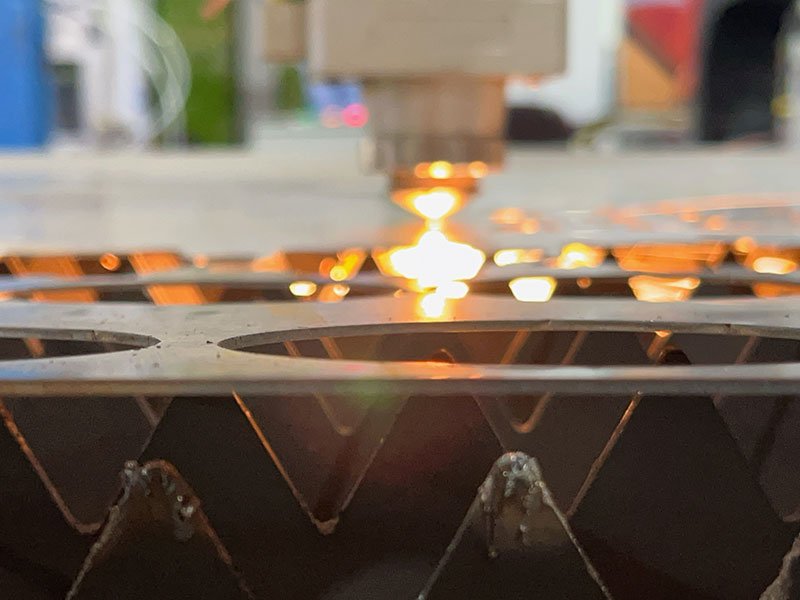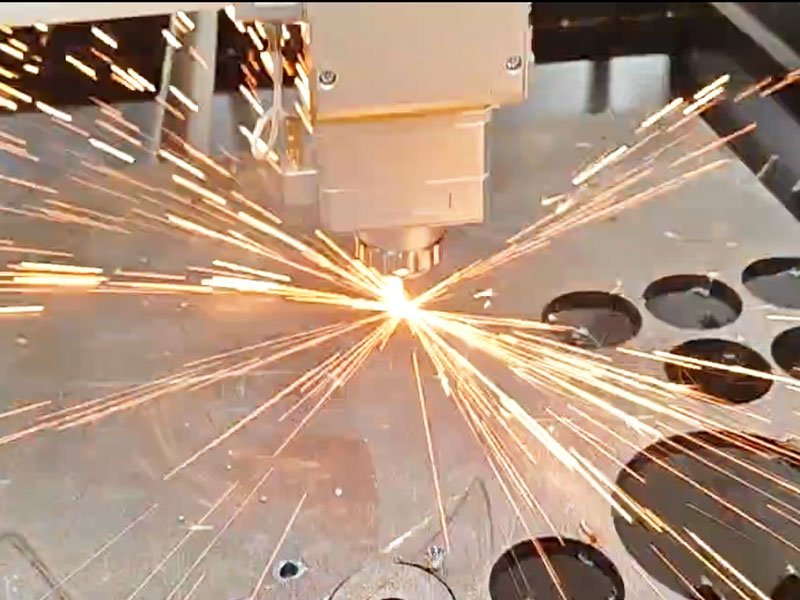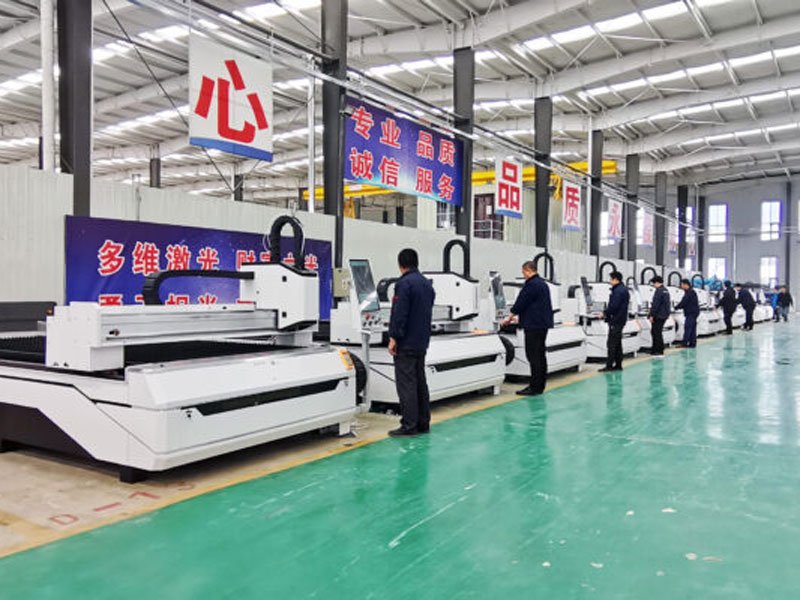Fiber laser cutting machines have always been favored by industrial business owners in terms of cutting accuracy and speed. This article will describe the laser cutting thickness chart and fiber laser cutting speed chart for junior laser cutting machine enthusiasts, which will help you better Learn about laser cutting equipment.

Many times when operating a laser cutting machine, there will be problems such as opaque cutting, burrs, and uneven cutting surfaces. The cutting ability of a metal laser cutting machine is related to the quality (power), environment, laser type, cutting speed and other factors of the cutting machine. Auxiliary gas can improve a certain cutting ability, so there is no absolute standard to judge its cutting thickness.
Fiber Laser Cutting Speed and Power 、Thickness Chart
| Laser Power (W) | Carbon Steel Thickness (mm) | Stainless Steel Thickness (mm) | Aluminum Thickness (mm) | Brass Thickness (mm) |
|---|---|---|---|---|
| 1000W | 0.8 – 10 | 0.8 – 5 | 0.8 – 3 | 1 – 3 |
| 1500W | 1 – 16 | 1 – 6 | 1 – 4 | 1 – 3 |
| 2000W | 1 – 20 | 1 – 8 | 1 – 6 | 1 – 5 |
| 3000W-3300W | 1 – 22 | 1 – 10 | 1 – 8 | 1 – 6 |
| 4000W | 1 – 25 | 1 – 15 | 1 – 10 | 1 – 8 |
| 6000W | 1 – 30 | 1 – 20 | 1 – 20 | 1 – 12 |

High power 8000W – 15000w fiber laser cutting thickness chart
| Laser Power (W) | Carbon Steel Thickness (mm) | Stainless Steel Thickness (mm) | Aluminum Thickness (mm) | Brass Thickness (mm) |
|---|---|---|---|---|
| 8000W | 1 – 40 | 1 – 30 | 1 – 30 | 1 – 16 |
| 10000W | 1 – 45 | 1 – 40 | 1 – 40 | 1 – 20 |
| 12000W | 1 – 50 | 1 – 45 | 1 – 45 | 1 – 20 |
| 15000W | 1 – 60 | 1 – 50 | 1 – 40 | 1 – 20 |
co2 laser cutting speed and power chart thickness chart
Metal matrix composite materials, leather, wood and fibers require the use of CO2 lasers. However, different materials have different adaptability to laser cutting due to their different thermophysical properties and laser absorption rates.
| Material | Thickness Range (mm) | Power Setting (Watts) | Cutting Speed (mm/s) |
|---|---|---|---|
| Acrylic | 1 – 10 | 25 – 150 | 5 – 20 |
| Leather | 0.5 – 5 | 40 – 100 | 10 – 60 |
| Cardboard | 0.5 – 10 | 30 – 80 | 15 – 70 |
| Knife Template Paper | 0.5 – 5 | 20 – 70 | 10 – 50 |
| MDF (Medium Density Fibreboard) | 1 – 20 | 40 – 200 | 5 – 20 |
| Rubber | 1 – 10 | 30 – 100 | 10 – 60 |
| Glass | 2 – 10 | 10 – 50 | 1 – 5 |
| Aspect | Description |
|---|---|
| Cut Quality | Narrow Kerf Width: Generally 0.1 – 0.5 mm High Precision: Typical hole center distance error of 0.1 – 0.4 mm, contour size error of 0.1 – 0.5 mm Smooth Cut Surface: Roughness usually Ra 12.5 – 25 μm Minimal Post-Processing: Welding is often possible without further processing |
| Cutting Speed | Example with 2KW Laser Power: Carbon steel (8mm thick): Cutting speed of 1.6 m/min Stainless steel (2mm thick): Cutting speed of 3.5 m/min Minimal Heat Affected Zone and Deformation: The area affected by heat is small, resulting in very little deformation |
Laser cutter wattage chart
- Acrylic: Higher power for thicker sheets. Speeds must be adjusted for smooth cuts and to prevent melting.
- Leather: Power and speed vary with thickness and type. Lower power and higher speed for thin leather to avoid burning.
- Cardboard: Moderate power; higher speeds to prevent burning and ensure clean cuts.
- Knife Template Paper: Typically requires moderate power. Adjust speed for clean cuts without burning.
- MDF: Requires higher power for thicker boards. Speeds should be managed to avoid charring.
- Rubber: Settings depend on rubber type and thickness. Adjust to prevent melting or deformation.
- Glass: Low power and very slow speeds due to sensitivity to thermal stress.
How thick can a laser cutter cut
Laser cutting thickness can be determined according to different materials and the power of the laser cutting machine.
Generally speaking, the cutting thickness of metal materials is relatively large, which can reach 100 mm or even thicker. For example, a 40000W ultra-high power laser cutting machine can easily cut metal plates thicker than 100 mm;
| Laser Cutter Power | Max Thickness of Carbon Steel (mm) | Max Thickness of Stainless Steel (mm) | Max Thickness of Aluminum Plate (mm) | Max Thickness of Copper Plate (mm) | Notes |
|---|---|---|---|---|---|
| 500W | 6 | 3 | 2 | 2 | |
| 1000W | 10 | 5 | 3 | 3 | |
| 2000W | 16 | 8 | 5 | 5 | |
| 3000W | 20 | 10 | 8 | 8 | |
| 4500W | N/A | 20 | N/A | N/A | Quality not assured above 12mm |
| 6000W | N/A | Higher | N/A | N/A | Better cutting ability, higher price |
For metal materials, use high-power fiber lasers or carbon dioxide lasers for cutting. These lasers can Generally speaking, the cutting thickness of metal materials is directly proportional to the laser power. For more common metal materials such as stainless steel, aluminum alloy, etc., the laser cutter thickness can range from a few millimeters to hundreds of millimeters.
What determines the cutting thickness of a laser cutting machine?
- Laser power
- Lens depth
- cutting material
4 Factors affect laser cutting speed table:
Cutting materials:
Different materials have different melting points and thermal conductivities, which indirectly leads to different cutting effects.
Material thickness:
Choosing the appropriate cutting thickness range will help increase the cutting speed.
Laser power:
Different powers have certain limits on cutting speed. Choosing the appropriate power according to the material being cut will help maximize the effect.
Cutting speed:
The fiber laser cutting parameters have a great impact on the cutting speed.

A clear grasp of laser cutting speed charts and fiber laser cutting thickness charts is an essential tool for all laser operators. A clear grasp of these knowledge is conducive to maximizing work efficiency, reducing material waste, and saving more money for business owners cost.
FAQ
Maximum thickness for laser cutting aluminum
120mm
Maximum thickness for laser cutting
100mm
